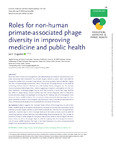2022-02-18Zeitschriftenartikel
Roles for non-human primate-associated phage diversity in improving medicine and public health
Gogarten, Jan F.
Mammals harbor trillions of microorganisms and understanding the ecological and evolutionary processes structuring these ecosystems may provide insights relevant to public health and medicine. Comparative studies with our closest living relatives, non-human primates, have provided first insights into their rich bacteriophage communities. Here, I discuss how this phage diversity can be useful for combatting antibiotic-resistant infections and understanding disease emergence risk. For example, some primate-associated phages show a pattern suggesting a long-term co-divergence with their primate superhosts—co-diverging phages may be more likely to exhibit a narrow host range and thus less useful for phage therapy. Captive primates lose their natural phageome, which is replaced by human-associated phages making phages an exciting tool for studying rates of microorganism transmission at human–wildlife interfaces. This commentary tackles avenues for selecting phages for therapeutic interventions based on their ecological and evolutionary history, while discussing frameworks to allow primate-associated phages to be incorporated into the arsenal of clinicians.
Files in this item

